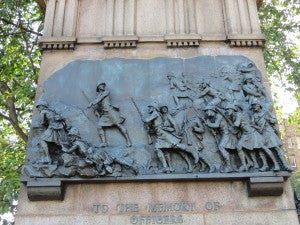- Regular
- £19.99
- Sale
- £19.99
- Regular
- £19.99
- Unit Price
- per

When I was young we called Remembrance Day ‘Armistice Day’, which reminded us that the 11th hour of the 11th day of the 11th month was neither Peace nor Victory, but simply a cease-fire between the Allies and Germany.

Memorial to the Battle of Jutland, May 1916
With hindsight the Allies were too eager for peace. Had we continued till the 12th hour of the 12th day of the 12th month we would have been well inside Germany. Hitler would never have been able to begin his rise to power in 1929 saying that the German armies had not been defeated in the field and that the sacred German soil had not been defiled by invaders. What if we had fought on? We would have lost more men. Would it have been worth it? One of the many ‘what if?’ questions we can ask about World War I.
It must have been 1947 when my father and I were cycling through Moniaive in Dumfriesshire, when they were having their Armistice Day parade and service. There were no massed bands, no serried ranks of smartly uniformed troops, no visiting dignitaries. All the uniforms that little Moniaive could muster were worn by Scouts
and Guides. It was really quite sad and a cynic would have found plenty of ammunition for smart-aleck remarks. A little lad sounded the ‘Last Post’. A wee bit wobbly – but then we remembered the hundreds of little boys, however wobbly, who died doing their duty. The lone piper tuned up his pipes and began to play ‘The Flowers of the Forest’. A chill went up my spine then, as it does now, as I remember it. As Lewis Grassic Gibbon wrote:
It rose and wept and cried, that crying for the men that fell in battle.
The solitary village piper became the symbol for the 500 pipers who were killed in the First World War and the 600 who were wounded. We heard the grand old words rolling out –
Their Name Liveth for Evermore
They will not grow old as we that are left grow old
– and wondered if they meant anything.
What did they die for? Was it worth it? In Aberdeenshire the poet JC Milne wrote:
Fecht for Britain? Hoot awa!
For Bonnie Scotland? Imph, man, na!
For Lochnagar? Wi’ clook and claw!
In the Parish of Arbuthnott the men whose names are on the War Memorial ‘sacrificed their lives for the good of humanity’. Something much more fundamental than King and Country.

Edinburgh (Comely Bank) Cemetery contains 225 burials of the First World War.
So now we have Remembrance Day and, in Edinburgh, an impressive Remembrance Garden. It is right and proper that we should recognise the sacrifice of those who died in the 20th century in the service of their country, and that, at last, recognition is being given to many who had been forgotten.
I have felt some anxiety about the official recognition of the World War I centenary. I am uneasy about the recognition of heroism, and in particular the award of some Victoria and Military Crosses. It was Siegfried Sassoon MC who said – probably tongue in cheek – of his award: ‘It was only the sort of thing which people often did during a fire or a railway accident.’
The Daily Telegraph’s main headline on Wednesday 3 August 1914 (‘England’s Declaration of War against Germany’) typifies a main concern of mine – the under-representation of Scotland and the Scots in the war narrative that continues to the present day. It is thought that Scots were proportionately twice as likely to volunteer as those in other parts of the UK and for us the butcher’s bill was twice as heavy. The revisionists are now challenging this. But they would, wouldn’t they?
These anxieties are examined and developed in my recent book, ‘A Dirty Swindle: True Stories of Scots in the Great War’, which is now available to buy.